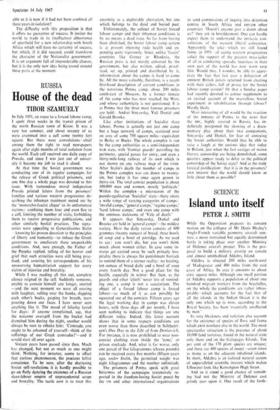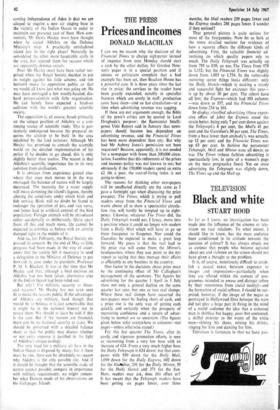island unto itself
SCIENCE PETER J. SMITH
While the Opposition prepares its censure motion on the collapse of Mr Denis Healey's Anglo-French variable geometry aircraft ven- ture, a more restrained but equally determined battle is taking place over another Ministry of Defence aircraft project. This is the pro- posal to build a military airstrip on remote and almost uninhabited Aldabra Island.
Aldabra is situated 260 miles north-west of Madagascar and 400 miles from the east coast of Africa. In area it amounts to about sixty square miles. Although one small portion of Aldabra supports a population of about one hundred migrant workers from the Seychelles, on the whole the conditions are rather inhos- pitable—which accounts for the fact that of all the islands in the Indian Ocean it is the only one which up to now, according to the Royal Society, has been 'essentially unaffected by man.'
Its very bleakness and isolation also account for the existence of species of flora and fauna which exist nowhere else in the world. The most spectacular attraction is the presence of about 10,000 land tortoises, found in the natural state only there and on the Galapagos Islands. Ten per cent of the 170 plant species are unique; and there are 400 species of insect—seven times as many as on the adjacent inhabited islands. In short, Aldabra is an isolated natural system of unparalleled scientific interest which makes Ullswater look like Kensington High Street.
And so it stood a good chance of remain- ing had not the Ministry of Defence cast greedy eyes upon it. One result of the forth-
coming independence of Men is that we are alleged to require a new air staging base in the vicinity of the Indian Ocean in order to maintain our presence east of Suez. How con- venient, Mr Denis Healey must have thought when he espied Aldabra on the Defence Ministry's map. A practically uninhabited island just in the right place! Naturally he considered the other more hospitable atolls in the area, but rejected them for reasons which are apparently defence secrets.
Poor Mr Healey must have been rather sur- prised when the. Royal Society decided to put its weight against his little scheme, and (oh horrors) make its opposition public so that we would all know just what was going on. He may have envisaged a few woolly-headed, die- hard preservationists with little organisation. He can hardly have expected a head-on collision with the world's greatest scientific society.
The opposition is, of course, based primarily on the unique position of Aldabra as a con- tinuing source of scientific study. This is par- ticularly endangered because the proposal re- quires the airstrip to be built in the area inhabited by the land tortoises. Although Mr Healey has promised to consult the scientific world on the detailed implementation of his policy if he decides to go ahead, this is only slightly better than useless. The reason is that Aldabra's scientific importance lies in its very isolation from civilisation.
It is obvious from experience gained else- where that once man moves in in the way envisaged the balance of nature will be largely destroyed. The necessity for a water supply will mean damming the island's lagoon, thereby altering the conditions under which birds and fish survive. Birds will no doubt be found to endanger the operation of jets, and vice versa, and hence lead to artificial control of the bird population. Foreign animals will be introduced either accidentally or deliberately. Quite apart from all this and much more, life cannot be expected to continue as before with an airstrip dumped right in the middle of it.
And so, last February, the Royal Society ex- pressed its concern. By the end of May so little ptogress had been made in the way of assur- ances that the society felt it necessary to send a delegation to the Ministry of Defence to put forward its case under its president, Professor P. M. S. Blackett. It was at this time that Mr Healey said that, although a final decision on Aldabra had not been taken, alternative sites in the Indian Ocean had been ruled out.
But why? For military, security or finan- cial reasons? Mr Healey has not even seen fit to make the reasons public. If the advantages of Aldabra are military, hard though that would be to believe, it is just conceivable that it might be in the national interest not to reveal them. We should at least be told if this is the case. But if the reasons are financial, there can be no national security at stake. We should be presented with a detailed balance sheet so that the public may discuss whether or not extra expense is justified in the light of Aldabra's unique ecology.
The very need for a military air base in the Indian Ocean is disputed by many; but if there must be one, there can be absolutely no reason why Aldabra is the only possible site. And if it should be thought that the scientific study of nature cannot possibly compete in importance with military requirements, we might remem- ber what Darwin made of his observations on the Galapagos Islands.































 Previous page
Previous page